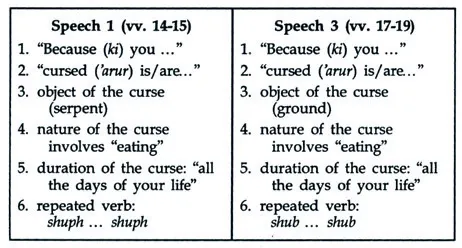
A striking thing about this [six-point] pattern is that it is totally absent in the speech to the woman. He does not say to her “Because [you have done this.]” No curse is pronounced on the woman, or even because of the woman.
Nothing is said about “eating,” and the phrase “all the days of your life” is omitted. Nor is there any alliterative verb repetition at the end.
Why is there no curse in the speech to the woman when each of the other speeches contains one? The best explanation seems to be that indicated in verse 13: The woman was deceived. She was not a malicious partner with the serpent trying to get the man to fall. Though she was responsible for her own sin, the serpent was the Tempter. He tried to induce the two to sin. It was a malicious act on his part. As for the man, though he was a target and victim of the serpent’s tempting, he sinned willfully. The common thread between the serpent and the man is the deliberate nature of their rebellion against God. Unlike the woman, who believed the serpent’s deception, the man and the serpent acted in wanton and willful disregard for God. So God inflicted curses23 as punishments because of those who deliberately did evil.
Excerpted from Dr. Joy Fleming, Man and Woman in Biblical Unity, p. 25.

